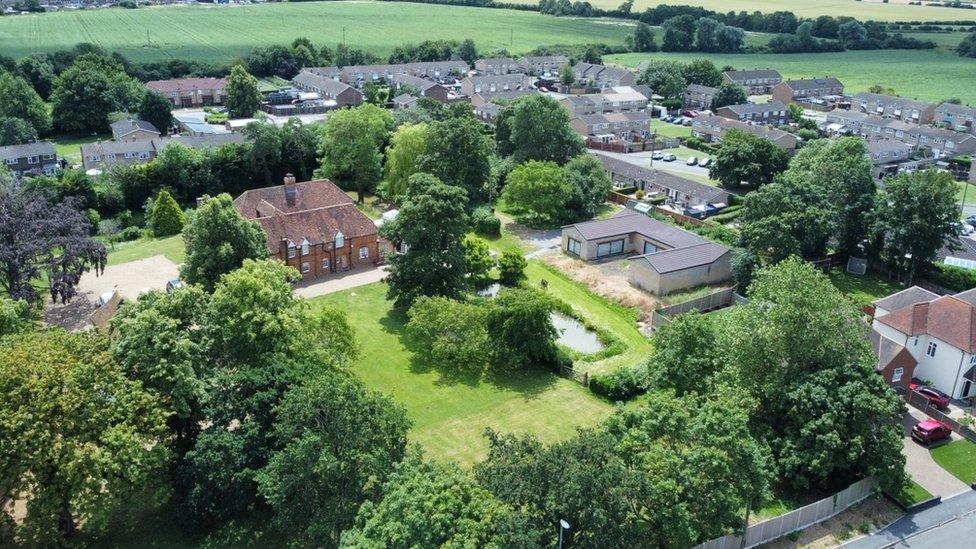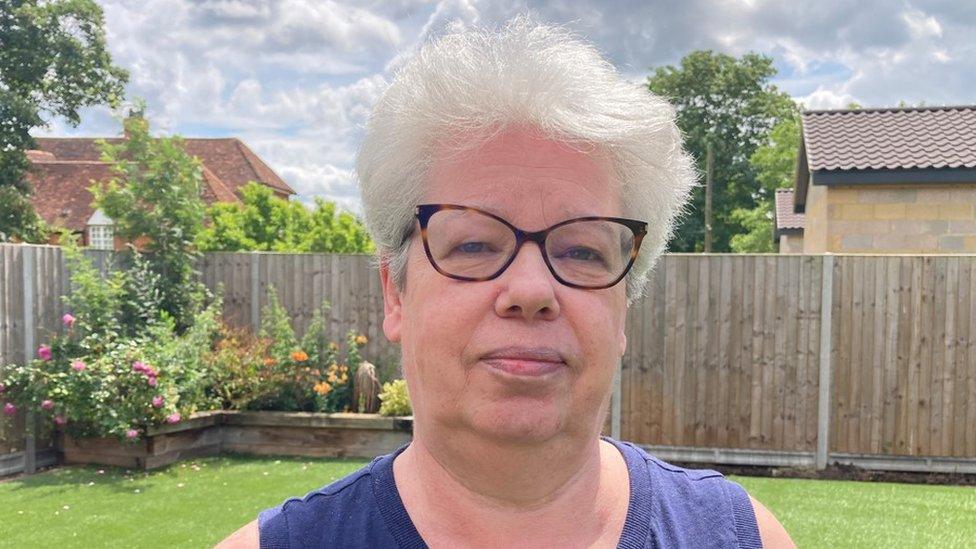Capt Sir Tom Moore's family defend unauthorised home spa
- Published

The spa (the C-shaped building to the right of the pond) is at the home where Capt Sir Tom Moore walked 100 laps of the garden in 2020, raising £33m for NHS Charities Together
The family of Capt Sir Tom Moore has defended an unauthorised home spa which has been ordered to be demolished.
The veteran fundraiser's daughter Hannah Ingram-Moore and her husband used the Captain Tom Foundation name on the first plans for the building, with revised plans then turned down.
The demolition order is subject to an appeal to the Planning Inspectorate.
In planning documents, the family said the structure was "no more overbearing than the consented scheme".
The Army veteran walked 100 laps of his garden in Marston Mortaine, Bedfordshire, at the start of the first coronavirus lockdown in 2020, raising £33m for NHS Charities Together.
Capt Sir Tom, who was born in Keighley, West Yorkshire, died in 2021 aged 100.
After he became an international figure, his family set up a separate charity in his name.

Captain Sir Tom Moore became famous for his fundraising efforts during the first coronavirus lockdown
The Ingram-Moores requested planning permission for a "Captain Tom Foundation Building", which was "for use by occupiers... and Captain Tom Foundation", according to documents submitted to Central Bedfordshire Council (CBC) in August 2021.
The local authority granted permission for the single-storey structure to be built on the tennis courts at the Grade II-listed home.
Then, in February 2022, the family submitted revised plans for the already partly constructed building, which called it the "Captain Tom Building".
The plans included a spa pool, toilets and a kitchen, which the Design & Access and Heritage Statement said was "for private use".
In November 2022, Central Bedfordshire Council refused the retrospective planning permission for the revised plans.
Residents overlooked by the building have labelled it an "eyesore".

The charity fundraiser died in 2021 at the age of 100
But in documents submitted for the Planning Inspectorate appeal, Colin Ingram-Moore said: "The subject building is no more overbearing than the consented scheme.
"The view is virtually identical save for a pitch roof being added to the elevational treatment. The heights are the same. As such there cannot be an unacceptable overbearing impact."
Mr Ingram-Moore said there were "no grounds supporting the refusal of the retrospective application" and asked the Inspectorate to uphold their appeal.
In the council's legal papers, it states its belief that there were "significant differences" between the approved and constructed buildings and that the authority "does not consider that the requirement to demolish the building is excessive".
It said the council considered "that the size and scale of the unauthorised building have an adverse impact on the amenity of the neighbouring dwellings".
It said reports detail "the harm caused to the setting of the listed building and, in particular, the significant difference between the two schemes that arises from the lack of sufficient public benefit that has been proposed in respect of the unauthorised building".
A date for the Planning Inspectorate appeal hearing has yet to be set.

Follow East of England news on Facebook, external, Instagram, external and Twitter, external. Got a story? Email eastofenglandnews@bbc.co.uk, external or WhatsApp us on 0800 169 1830
- Published15 April

- Published6 July 2023

- Published5 July 2023

- Published4 July 2023
